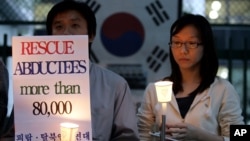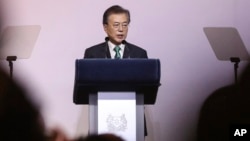A proposed South Korean law to reclassify abductees held in the North as “missing persons,” is drawing strong criticism from human rights advocates.
“Abduction is a crime. Missing person is not classified under international law as a crime. So the question is why would you do that?” asked Joanna Hosaniak with the Seoul based advocacy group Citizens’ Alliance for North Korean Human Rights (NKHR.)
NKHR was one of 11 human rights organizations that sent a joint letter of complaint to the United Nations Human Rights Office in Seoul about the proposed South Korean National Assembly bill that would remove the term “abductee” in referring to cases of South Korean citizens that are believed to have been captured and held indefinitely by the communist North.
The bill cites the need to replace the accusatory and criminal classification of abductee because it “draws resistance from North Korea,” and to replace it with the term “missing person” instead.
Forgotten families
After the 1950-53 Korean War, North Korea returned most prisoners of war, but reportedly forced thousands of South Korean citizens to remain to help rebuild national industries, schools and other basic state functions. In the decades after, thousands more were reportedly abducted by North Korea. Most of them were fishermen, who were purportedly taken to gain intelligence or serve some propaganda purpose in the ongoing inter-Korean cold war.
NKHR, working closely on this issue with victims’ families and the United Nations Working Group on Enforced or Involuntary Disappearances, has documented more than 500 cases of Korean abductees still being held in the North, and of that number 300 are more than 70 years old.
Families of the abductees say the government in Seoul has long ignored this contentious issue because it would complicate efforts to confront the North when tensions are high over its nuclear provocations, or to engage Pyongyang when diplomatic efforts are underway to improve relations.
Hwang In-cheol has been speaking out for the release of his father and 11 other passengers and crew members aboard a Korea Air (KAL) airliner who were never returned, after the plane was hijacked into North Korea in 1969. He said that the South Korean government has refused to help.
“My father and the rest of the 11 unreturned abductees remain forcefully detained in North Korea and they have been forgotten,” said Hwang, who heads an advocacy group called the KAL Abductees’ Repatriation Committee.
International standards
The U.N. human rights commission has denounced North Korea for abducting an estimated 200,000 foreign nationals from at least 12 countries, including China, Japan, South Korea, and Thailand over the last 50 years.
North Korea admitted in 2002 to kidnapping 13 Japanese citizens, and only five of the abductees and their families have returned to Japan.
A 2014 United Nations Commission of Inquiry report cited the abductions of individuals in South Korea and Japan among other widespread human rights violations committed by North Korea, including the establishment of a network of prison camps, forced labor, state sanctioned murder, torture and rape.
The U.N. General Assembly subsequently voted to refer the Kim Jong Un government to the International Criminal Court for crimes against humanity. However, the measure stalled in the U.N. Security Council where the North’s allies, China and Russia, are believed to be preventing it from coming to a vote.
Pyongyang has called the human rights allegations “fictitious,” criticized the U.N.’s investigation into North Korea as politically motivated, and criticized Japan for “internationalizing” the abduction issue.
South Korean President Moon Jae-in, who heads the ruling progressive Democratic Party and is a former human rights lawyer, has played a key role in reviving diplomatic talks with Pyongyang to increase inter-Korean cooperation and to work toward removing all nuclear weapons from the Korean Peninsula.
Moon’s ruling party proposal to reclassify abductees as missing persons is seen by some supporters as a way to diffuse the contentious issue and to gain Pyongyang’s cooperation to resolve these claims without assigning blame or penalty.
Human rights advocates, however, argue the bill is contrary to international human rights standards referring to crimes of abduction and enforced disappearance and is a betrayal to the victims’ families that have demanded justice and accountability.
“They feel their own country is failing them. Their own country is betraying them. I think this is completely wrong,” Hosaniak said.
The coalition of human rights groups in Seoul have called upon the Special Rapporteur for human rights in North Korea and the U.N. Human Rights Office in Seoul to ensure that the South Korean government adheres to the past U.N. recommendation to “firmly integrate human rights and accountability into any political process for the Korean Peninsula.”






